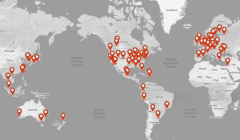2022 Year in Review: Persecution Trends

Among the numerous key developments in China during 2022, Falun Gong remained an integral part of the Chinese Communist Party’s state of affairs.
Even over 23 years since the persecution was launched, Falun Gong remains a target of the security service, facing large-scale abuses including arbitrary detention, imprisonment after sham trials, systematic torture, and death.
Each year, there are emerging trends and evolving tactics in how the persecution is being carried out, as well as how actors within China and globally are responding.
The following are five key trends from 2022.
1) Increased persecution of Falun Gong in China before and during the 20th Party Congress
From October 16 to October 22, 2022, the Chinese Communist Party (CCP) held its five-year party congress at which Xi Jinping was anointed for an unprecedented third term as party leader. Such gatherings typically provoke security services to intensify surveillance and persecution of Falun Gong practitioners, among other targeted groups, under the pretext of pre-emptively restricting expected sources of dissent.
As early as February, local government websites were already announcing actions to closely monitor Falun Gong believers in preparation for the 20th Party Congress. On February 24, 2022, government delegates in Gansu Province met to “further strengthen the prevention and crackdown on Falun Gong” including through increased online censorship under the guise of “safeguarding national security and political stability.” [1]
As the event approached, throughout September and October numerous reports emerged of police monitoring the daily movements and homes of local practitioners more closely than usual. This occurred in locations far from Beijing, where the Congress was taking place, including in Shanghai and Northeast China. In Shandong Province, between late September and October 25 (when the Congress ended), Dongying City police followed Falun Gong practitioner and former translator Ms. Wang Fan everywhere she went (see photo). [2]

In another case on September 30, three officers in Dalian City, Liaoning Province who harassed 56-year-old practitioner Ms. Fang Caixia threatened, “We are here to ‘safeguard’ the 20th Party Congress. Even if we have to dig three feet down to find you, we’ll do it. Before the 20th Party Congress, we have to meet with you once a week.” [3]

2) Detentions and prosecution of Falun Gong believers for sharing COVID-19 information
Since the onset of the COVID-19 pandemic, Falun Gong practitioners have been among the contingent of ordinary citizens in China who have successfully shared uncensored information about infections with fellow citizens and the outside world. Fearful of this exposure, Chinese security agencies have intensified surveillance and detention of adherents since early 2020. This trend continued in 2022 amid the CCP’s draconian Zero-COVID lockdowns that spread across the country.
Cases of Falun Gong practitioners detained for sharing information about COVID-19 also made their way through China’s politicized court system. In one of the most high-profile cases, Ms. Xu Na was sentenced in January 2022 to eight years in prison for sending photos and information about pandemic restrictions in Beijing to an overseas website. [4] [5] [6]

Fang Bin, a citizen journalist who was detained by Chinese authorities in March 2020 after he published videos on YouTube detailing the situation inside Wuhan, has been held incommunicado. He was last seen in Wuhan’s Jiang’an Detention Center in November 2021. [7] Fang had previously been imprisoned and tortured for practicing Falun Gong.
3) At least 101 Falun Gong practitioners died in 2022 due to the CCP’s violent repression
During the year, a network of citizen journalists in China documented 101 cases of Falun Gong practitioners dying in custody or after release due to the Chinese government’s harsh persecution. Among this group was Ji Yunzhi, the 66-year-old mother of New York architect Simon Zhang. [8]
Ms. Ji was detained in Bairin Left Banner Detention Center three days before the Beijing Winter Olympics after police broke into her home. Ji Yunzhi died after only 49 days in custody on March 21, 2022, with signs of abuse viewed by family.
As of January 1, 2023, these new cases bring the total of documented Falun Gong deaths due to persecution to 4,904 since July 1999, as recorded by Minghui.org. The actual number of those killed for their belief is certainly larger, reflecting the difficulty of obtaining detailed information, including for victims targeted for organ harvesting. These deaths are the extreme end of a wider range of persecutory tactics deployed by security forces in China against those known to practice Falun Gong.
In 2022, Chinese police arbitrarily detained at least 3,137 practitioners and 446 were sentenced to prison terms of up to 15 years after sham trials. Hundreds of others were sent to extralegal brainwashing centers or forced to flee their homes to avoid detention. [9]
3,557 Falun Gong practitioners were harassed by police via home visits, warrantless searches, digital surveillance, physical monitoring, or financial extortion. At least 128 people reported being forced to undergo medical testing or having biometric information collected, such as blood samples, voice recordings, DNA samples, or fingerprints, both in custody and in their homes. [10]
4) Death of Jiang Zemin, new international sanctions, and internal CCP purges of Chinese officials involved in persecuting Falun Gong
Jiang Zemin, the former CCP dictator who single-handedly mandated in 1999 that Falun Gong must be “eradicated” through a deadly campaign of propaganda, mass imprisonment, and coercive “transformation” of Falun Gong practitioners, died on November 30, 2022. [11] Other Chinese officials who played a key role in persecuting Falun Gong faced direct or indirect repercussions during the year. On December 9, 2022, the US Department of State imposed sanctions on Tang Yong, former deputy director of the Chongqing Area Prisons “for his involvement in gross violations of human rights, namely arbitrary detention of Falun Gong practitioners, which also amount to particularly severe violations of religious freedom;” the sanctions included visa restrictions on Tang and his family members. [12]

Wu Yingjie, Party Secretary of the Tibetan Autonomous Region from 2016 to 2021, faced similar sanctions. In addition to suppressing ethnic Tibetans, during Wu’s time in office, Falun Gong practitioners in the region were also severely persecuted for their belief, and he was named as a key perpetrator of the persecution by Minghui.org. [13] [14]
This round of sanctions was the second time that the State Department under the Biden Administration had sanctioned a CCP official for gross violations of human rights against Falun Gong and the third time total, as one official was sanctioned during the Trump administration. [15]

Within China, Fu Zhenghua and Peng Bo—former leaders of the notorious 610 Office which leads the anti-Falun Gong campaign—were purged, penalized for corruption violations, and sentenced to life in prison in September 2022 and 14 years in November 2022, respectively. Although Fu and Peng’s punishments were not tied to their roles in persecuting Falun Gong, the punishments remove yet two more officials tied to the campaign from the party’s upper echelons and signal to lower officials that they too can become the CCP’s victims. Fu Zhenghua, in particular, has been long named by human rights experts as an official who should face sanctions from the United States and other democracies for his role in persecuting Falun Gong and others in China. [16]
5) New evidence of organ transplant abuses and international responses
During 2022, new research was added to the growing volume of evidence indicating that Falun Gong believers and other prisoners of conscience are killed for their organs to fuel the growing transplant industry in China.
In the American Journal of Transplantation, researchers Matthew Robertson and Dr. Jacob Lavee confirmed in April that dozens of Chinese hospitals have not abided by the well-established medical principle associated with a basic rule of transplant ethics: Donors must be deceased before vital organs are removed. [17] The research paper titled “Execution by organ procurement: Breaching the dead donor rule in China,” found scores of reports—over a three-decade period, at 56 Chinese hospitals, involving more than 300 medical workers—in which patients are not brain dead yet, effectively killing the living person through organ extraction. [18]
Medical and ethics experts Julian Sheather, Steve Tsang, and Zoe Greaves at the British Medical Association noted in their journal that “the Chinese government systematically deployed medical professionals, medical skills, and medical technologies in pursuit of these crimes.” [19] In a peer-reviewed Cambridge Quarterly of Healthcare Ethics Journal article, “Cases Abusing Brain Death Definition in Organ Procurement in China,” the authors concluded that there is a need for “systematic investigation into organ donation from claimed brain-dead donors.” [20]
These revelations and broader awareness raising of organ transplant abuses in China spurred action from parliaments and medical professionals. In the United Kingdom, the amendment to Health and Care Act 2022 in May 2022 prohibits commercial organ tourism to China, as well as other countries; in Canada, Bill S-223 passed in December addresses forced organ harvesting in the same way; in the United States, the bipartisan Stop Forced Organ Harvesting Bill was referred to the Senate Committee on Foreign Relations and House Committee on Foreign Affairs; and Taiwan legislators have proposed the Bill of Combating and Preventing Forced Organ Harvesting. [21] [22] [23] [24] [25]
As for the medical sector, the International Society for Heart and Lung Transplantation was the first medical organization to prohibit article submissions “related to transplantation and involving either organs or tissue from human donors in the People’s Republic of China” from The Journal of Heart and Lung Transplantation and the ISHLT symposia. [26] Additionally, medical professionals in the above journal cautioned other professionals against training visiting physicians or surgeons who could use the gained knowledge in “transplants based on organs from executed prisoners or any other transplant-related crime” in their home countries. [27] In November, the Academy of Forensic Nursing (AFN) and Doctors Against Forced Organ Harvesting (DAFOH) hosted the first inaugural Nurses Summit to Combat and Prevent Forced Organ Harvesting. [28] The summit was dedicated to preventing global collusion with the Chinese forced organ harvesting industry and offered solutions for protecting ethical medical practices.
Read the full statistics of newly reported cases in 2022 here:













